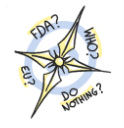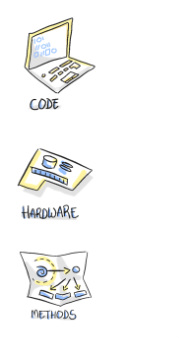OpenQRS in 30 Seconds
OpenQRS in 30 Seconds from Kate Ettinger on Vimeo.
OpenQRS harnesses new technologies- sensors, wireless, mobile- to develop an open data system
to assure quality, reliability, safety (QRS) of health care devices
with the goal to make it easy, effective and affordable to monitor QRS data for devices anywhere.
to assure quality, reliability, safety (QRS) of health care devices
with the goal to make it easy, effective and affordable to monitor QRS data for devices anywhere.
TEDx: Integrity by Design: the idea behind OpenQRS
OpenQRS
Vision
Our vision is to provide a seamless experience for product designers to have easy to use, effective and affordable open source tools that capture data on quality, reliability and safety (QRS) directly from medical devices.
OpenQRS develops open source tools (hardware/software) that harness sensor, wireless, mobile and emerging technologies to enable devices to communicate directly to a data monitoring system. OpenQRS will enable product designers to monitor how their devices functions in real world settings in real time in order to accelerate responsive design and to detect micro failures that precede major failures. Access to information on device performance can inform design decisions and enable better decisions about health care products.
Problem
The development of medical devices is a burgeoning industry globally. Due to a new type capital focused on "impact" investment, medical devices are increasingly being developed to meet the needs of people in Africa, Latin America and Asia. Typically, government-based systems oversee assurance for the quality, reliability and safety of medical devices. The status quo is a two tier system. One in established markets with regulatory systems, such as the Food and Drug Administration (FDA) in the United States (US). Though even the “gold standard” FDA has been critiqued as stifling innovation with expensive processes and failing in its safety objective following several serious problems with approved devices. While regulation of device quality and safety may be less than optimal in the US, the second tier have no standards-based regulation. In many low and middle income countries, requirements to demonstrate device safety may be absent or arbitrary.
Our vision is to provide a seamless experience for product designers to have easy to use, effective and affordable open source tools that capture data on quality, reliability and safety (QRS) directly from medical devices.
OpenQRS develops open source tools (hardware/software) that harness sensor, wireless, mobile and emerging technologies to enable devices to communicate directly to a data monitoring system. OpenQRS will enable product designers to monitor how their devices functions in real world settings in real time in order to accelerate responsive design and to detect micro failures that precede major failures. Access to information on device performance can inform design decisions and enable better decisions about health care products.
Problem
The development of medical devices is a burgeoning industry globally. Due to a new type capital focused on "impact" investment, medical devices are increasingly being developed to meet the needs of people in Africa, Latin America and Asia. Typically, government-based systems oversee assurance for the quality, reliability and safety of medical devices. The status quo is a two tier system. One in established markets with regulatory systems, such as the Food and Drug Administration (FDA) in the United States (US). Though even the “gold standard” FDA has been critiqued as stifling innovation with expensive processes and failing in its safety objective following several serious problems with approved devices. While regulation of device quality and safety may be less than optimal in the US, the second tier have no standards-based regulation. In many low and middle income countries, requirements to demonstrate device safety may be absent or arbitrary.

Every year new health care devices are designed to solve crippling global health challenges by university students. Many of these smart inventions, such as a neonatal sleeping bag for premature babies born at home, a prosthetic leg with a pivot knee to navigate unpaved terrain, a neonatal incubator made from used car parts, a low cost pulse oximeter that plugs into a smart phone to monitor lung function during surgery in a rural clinic, struggle to make it to their intended markets. These low cost devices target low and middle income countries, which often have no formalized systems to guide how to demonstrate a device’s quality, reliability and safety.
For entrepreneurial health product designers determining what, if any, standards to follow can be a confusing maze of options (FDA, EU, WHO), which are often not appropriate to the target market. The net result of the current landscape is that many products never make it from the lab to the field to benefit people and that adoption by providers may be limited due to lack of data on quality, reliability and safety. When products follow established guidelines, such as the FDA, the product’s price point increases making it unaffordable for the originally intended low income market.
At the same time, staggering health care costs in developed economies have prompted people to seek “frugal innovations” (clever inventions designed to meet the cost/needs of people in low income countries) that could provide “affordable technology” solutions in more established markets. Yet for these products, there is no trusted way to demonstrate quality, reliability and safety other than through the costly FDA pipeline.
These market conditions create an opportunity. The common problem is a lack of easy to use, affordable and accepted way to assure quality, reliability and safety for medical devices. OpenQRS focuses on building tools (hardware, software, methods) to monitor QRS data of medical devices. Now is the time to build an open solution, so that it is always possible and affordable to assure quality and safety in device development.
For entrepreneurial health product designers determining what, if any, standards to follow can be a confusing maze of options (FDA, EU, WHO), which are often not appropriate to the target market. The net result of the current landscape is that many products never make it from the lab to the field to benefit people and that adoption by providers may be limited due to lack of data on quality, reliability and safety. When products follow established guidelines, such as the FDA, the product’s price point increases making it unaffordable for the originally intended low income market.
At the same time, staggering health care costs in developed economies have prompted people to seek “frugal innovations” (clever inventions designed to meet the cost/needs of people in low income countries) that could provide “affordable technology” solutions in more established markets. Yet for these products, there is no trusted way to demonstrate quality, reliability and safety other than through the costly FDA pipeline.
These market conditions create an opportunity. The common problem is a lack of easy to use, affordable and accepted way to assure quality, reliability and safety for medical devices. OpenQRS focuses on building tools (hardware, software, methods) to monitor QRS data of medical devices. Now is the time to build an open solution, so that it is always possible and affordable to assure quality and safety in device development.

Approach
OpenQRS engages health care product designers passionate to harness new technology, such as sensors, wireless, mobile - to develop an open data system that informs the public about the quality, reliability and safety (QRS) of health care devices with the goal to make it easy, effective and affordable to monitor QRS data for devices deployed anywhere in the world. OpenQRS aims to enhance the design and development process of health care devices by encouraging collaboration among hardware/software developers, fostering cocreation with end users, and providing the public with useful data about health care devices.
Our proposed approach made it to the Semi-Finals in the 2013 Knight Foundation News Challenge Proposal
Follow our iterative development on our blog: build.openqrs.org
OpenQRS engages health care product designers passionate to harness new technology, such as sensors, wireless, mobile - to develop an open data system that informs the public about the quality, reliability and safety (QRS) of health care devices with the goal to make it easy, effective and affordable to monitor QRS data for devices deployed anywhere in the world. OpenQRS aims to enhance the design and development process of health care devices by encouraging collaboration among hardware/software developers, fostering cocreation with end users, and providing the public with useful data about health care devices.
Our proposed approach made it to the Semi-Finals in the 2013 Knight Foundation News Challenge Proposal
Follow our iterative development on our blog: build.openqrs.org